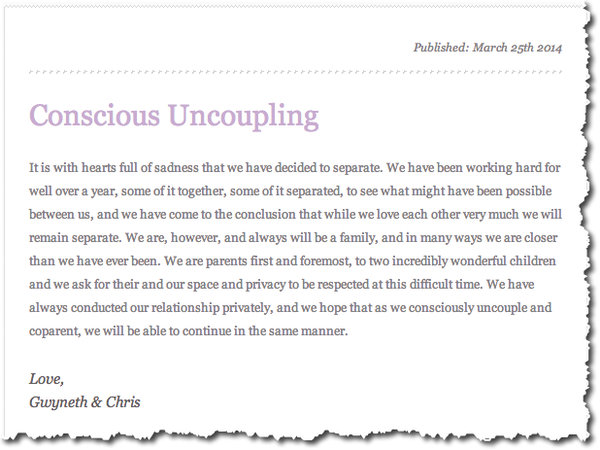The split of Academy Award Winner Gwyneth Paltrow from Cold Play frontman Chris Martin recently has made news headlines. But not just because they are ending more than 10 years of marriage, but because of the way it was announced.
Gwyneth announced the split on her blog Goop, under the headline ‘conscious uncoupling’.
Table of Contents
The online reaction was a collective ‘huh’? as people started to ask, “what is conscious uncoupling”?
While I haven’t come across this specific phrase myself, I was aware of the meaning behind the terminology and was interested to find out more about its origins.
The origins of conscious uncoupling
The Wall Street Journal gives an interesting history of the origins of the term that has received worldwide attention.
The WSJ says:
“Coupling” has referred to romantic or sexual unions since the rise of Middle English (“couple” shares a Latin root with “copulate”). When the Book of Common Prayer was first published in 1549, marriage officiants were instructed to ask “if any man do allege any impediment why they may not be coupled together in matrimony.”
“Uncoupling,” meanwhile, has tended to refer to the detachment of inanimate things, such as railroad cars. When the American Thesaurus of Slang gave “uncouple” as a synonym for getting a divorce in 1942, the usage was likely tongue-in-cheek.
The phrase then evolved when sociologist Diane Vaughan formulated the “uncoupling theory” in 1976. This appears to be the first appearance of the term in the sphere of psychology.
In 2009, the phrase was used by U.S. marriage therapist Katherine Woodward Thomas, who has since gone on to create an online course in conscious uncoupling.
The meaning of conscious uncoupling
‘Conscious uncoupling’ refers to the idea of ending a marriage or relationship in a way where both parties do it with awareness and integrity.
At the forefront of this approach to separation is the intention not to injure each other and for the well-being of children to be placed above all other disagreements and negative emotions.
The creator of the online course, and author Katherine Woodward Thomas, says the ‘conscious uncoupling process’ is about taking a healthy approach to ending a romantic relationship. She believes it doesn’t have to be contentious, antagonistic, or destructive so both parties can have a new healthy life.
The process is about supporting goodwill, self-awareness, generosity, and respect, leaving both parties feeling valued and appreciated for all they have shared. In its essence, it’s about two people striving to minimise the damage to themselves, their children, and their futures to find emotional freedom and set healthy boundaries.
Is this just pretentious speak for “we’re getting a divorce”?
Many have referred to the phrase as being pretentious and just a prettier way of saying, “we’re over!”.
Perhaps you have your own reaction to the phrase. Personally, this smells of psychobabble to me.
I also wonder whether the intention for the process of generating ‘goodwill, generosity, and respect’ is idealistic in some cases.
I totally support couples in finding a way to end their relationship in a respectful way where possible when they have decided this is the best decision for the couple’s relationship. But there’s often no avoiding feelings of deep hurt, disappointment, and sometimes regret that come after the end of a relationship.
In a perfect world, perhaps we could all engage in ‘conscious uncoupling’ when we decide to end intimate relationships, but I think real relationships are messier and not as predictable. Many people don’t or can’t anticipate the emotional wound and flood of feelings that come when they end a relationship. There’s no doubt that in a long-term relationship, it’s a significant loss that can have a huge impact on an individual’s personal growth.
What are your thoughts on ‘conscious uncoupling’? Do you think it’s psychobabble, or genuinely deserves to be something to aim for when ending a relationship?
Do you need relationship help?
If you need help with your relationship, contact Clinton Power + Associates on (02) 8968 9323 to discuss your situation and find out how we can help.
photo credit: ConcertTour, Erprofe
Since 2003, Clinton Power has helped thousands of couples and individuals as a counsellor and psychotherapist in private practice in Sydney and online in Australia. Clinton regularly comments in the media on issues of relationships and has appeared on Channel 7, The Sydney Morning Herald, and ABC Radio. Clinton’s eBook, 31 Days to Build a Better Relationship is available through his website or Amazon. Click here to take Clinton’s relationship checkup quiz to find out how well you know your partner.


